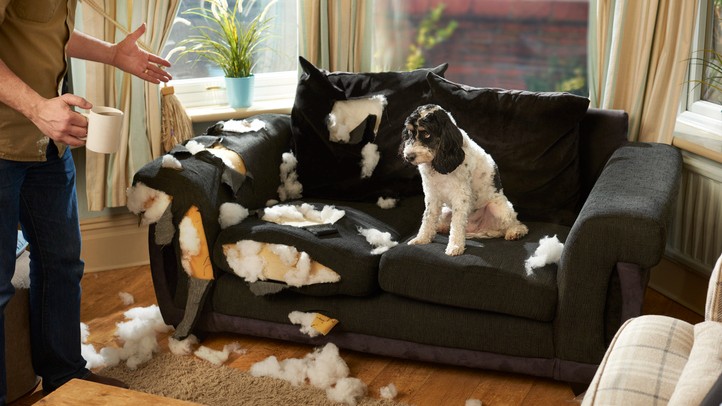10 ways to protect furniture from pets
Ways to protect furniture from pets to minimize the damage they can cause

Get the best advice, tips and top tech for your beloved Pets
You are now subscribed
Your newsletter sign-up was successful
There are ways to protect furniture from pets that it helps to know, and it's a big consideration when thinking about adding an animal to your life.
We all love the furry companions we share our homes with, but we tend not to be so keen on the effect they have on furniture and fittings. From animal hair, to scratch marks and chewed table legs, even them marking their territory, our soft furnishings can take a beating from our furry friends. Furniture damage comes as part and parcel of animal ownership because it's part of the innate behaviors they were born with. However, with a few simple precautions, a lot of the potential damage can be minimized.
Below we explore 10 ways to help pet-proof your pad.
1. Keep your pet well groomed
Unless your animal doesn't shed you are going to face a constant battle to keep their fur off the furniture. This problem can be considerably reduced by employing a regular grooming routine. It's much easier to clean your pet's loose hair from a brush than from the carpet.
This has the added benefit that your furry friend will be cleaner, healthier and sleeker, and it will give you valuable bonding time with your pet. We have a couple of guides on how often you should brush you pet here: How often should I brush my cat? and How often should you brush your dog?
You can also see our vets' guides to grooming aggressive cats and how to groom a dog for more advice.
2. Keep your pet's nails manicured
Cats' and dogs' nails can do a lot of damage to your furniture and furnishings. However, if you make a manicure part of your regular grooming routine, those shortened and polished nails will mean a lot less destruction.
Get the best advice, tips and top tech for your beloved Pets
Scratching is innate so there is no point in shouting at your pet when they do it, they won't understand why you are angry and won't associate it with their destructive behavior. Cats scratch to mark their territory, stretch the muscles in their back and to keep their nails sharp. Dogs scratch the surface of where they sleep to mark it with scent and make it comfortable – you can see more about that here: Why do dogs scratch their bed?
If you are nervous about cutting your furry pal's claws, you can see more on how to approach it safely here: A vet's guide to clipping dog nails and cat nail clipping.
3. Provide them with something better to scratch on
As mentioned, cats need to scratch to keep their nails and body in good working order, so why not provide them with something they are allowed to scratch. For this you can choose one of our round up of the best cat scratching posts or make your own DIY cat scratching post.
Of course, getting them to use the scratching post rather than your sofa can be hard. There are ways you can encourage it, though. Placing the scratching post next to where they usually exercise their claws and spraying the post liberally with catnip will help them transfer their destructive behavior to where you want it. Providing both vertical and horizontal scratchers will mean they can sharpen their claws in a way they are used to.
4. Give them something better to lick or chew on
Both dogs and cats will prefer to chew on something tasty rather than bland, so if you provide them with a treat or a chew they may well turn their attention away from those wooden table legs. Our round up of the longest lasting dog chews and the best cat treats offer you great options for chews that can be left around the house to distract them. You can also use durable dog toys that can be stuffed full of treats to keep their attention, as well as cat puzzle feeders and dog puzzle toys to keep their chewing habits satisfied.
Doing this will also provide a tasty alternative for animals that like licking the furniture, as those animal chews will appeal to their taste buds more than the couch. Note that cleaning up spills will also stop animals licking the furniture.
5. Keep pets well exercised and entertained
A lot of destructive behavior stems from boredom. If your pet has nothing to do or has a lot of pent-up energy, scratching or chewing those chair legs becomes a lot more attractive. Ensure they have treats to chew on and a selection of the best cat toys and best dog toys to keep their minds exercised.
The other way to get rid of boredom is to ensure they are well exercised. A tired animal is a lot less likely to need to take their frustration out on your furniture and furnishings. If you can, give them regular access to a garden or outdoor space so they can get the exercise they need there.
6. Provide them with a comfy place to call their own
A lot of the damage caused to floors and couches is due to your animals using them as the place they rest. Giving them a section of your house to call their own means dirt, fur and smells will be contained in that one area. Also, as mentioned earlier, dogs scratch the surface of where they sleep to mark it with scent so it's better that they do this on their own bed than yours!
Choosing a durable dog bed or cat bed or hammock will keep their fur off your couch, and if you get one that's easy to clean (see how to wash a dog bed) it should be a much simpler job to keep them in order than having to tidy the whole house.
You can see more about how to get them to use their own bed here: How to keep dogs off the couch and keep your furniture fresh.
7. Choose pet friendly furniture
You may not want to change your furniture, but if you are ready to make a new purchase anyway it may be clever to choose a sensible material to save you a lot of cleaning work in the future. Leather, pleather or microfiber furniture is far more resilient and wipe-clean than other materials so may be a better choice for your home. All three are difficult to stain, repel water and other liquids, and are easy to remove hair from.
8. Pet proof your furniture using covers
Using washable blankets, slipcovers and throws to protect your furniture, particularly on the spots favored by your fluffy friends can save you a lot of hassle when it comes to cleaning and protecting your furniture. This means you can just wash the covers once in a while rather than having to vacuum your couch every day. They are also easy to whip off if you have visitors coming around.
9. Deter pets using smells
If your pet is scratching or choosing to relieve itself on your furniture or carpet you can dissuade them from certain areas using smells. Both cats and dogs have a much stronger sense of smell than we do so strong-smelling perfumes will keep them away. Citrus odors which smell nice to humans deter both dogs and cats, and they are readily available in spray form. Other smells animals can find distasteful include eucalyptus, lavender and cinnamon.
10. Control where you pet can go
Simply closing the door to a room you want to keep hair and smell free is a great way to ensure your best furniture remains undamaged. Similarly, fencing areas of the house off using pet gates or other barriers will prevent them from sneaking in when you aren't around. As long as your pet gets to socialize with the family in other rooms, there is no harm in creating a no-go area for your furry companions.
Jamie Middleton is a freelance editor and writer who has been editing and creating content for magazines and websites for over 20 years. As well as writing about the pets he loves, he has helped create websites about tech and innovation like TechRadar.com, Innovate UK and TechSPARK, written programmes for music festivals, books on inventions and architecture, TV listings magazines, and edited publications about cars such as Lexus, Toyota and Jaguar. In his spare time he writes fiction books and poetry - or at least he does when he is permitted to by his cat Pirate, who enjoys the warmth of laptops too much to allow being creative to get in the way.

